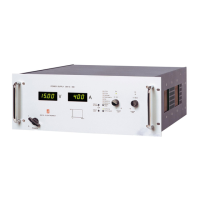Do you have a question about the Delta Elektronika SM 3000 Series and is the answer not in the manual?
| Cooling | Forced Air |
|---|---|
| Control Interface | Analog, RS232 |
| Operating Temperature | 0-50 °C |
| Relative Humidity | non-condensing |
| Protections | OVP, OCP, OTP |
General safety precautions for operation, service, and repair.
Evaluation of power supplies for installation category II (Over voltage category II).
Instructions for connecting the instrument chassis to the AC Power Supply mains for safety.
Guidance on fuse replacement by authorized personnel for fire risk protection.
Warning against exceeding input voltage and frequency ratings for the instrument.
Precautions for operating personnel regarding live circuits and component replacement.
Policy on parts substitutions and modifications requiring authorized service personnel.
Describes constant voltage/current modes and output ranges for various SM series models.
Details on wide input voltage range, 3-phase, single-phase, and DC/DC converter usage.
Information on input circuit, series choke, inrush current limiter, and soft start.
Low power consumption in standby mode and use of Remote ShutDown input.
High and constant efficiency over a wide output current range.
Guidance on measuring load regulation directly on output terminals.
Details on low output ripple and noise, and proper measurement techniques.
External analog voltage programming, protection circuits, and earth loop prevention.
Programming and reading back voltage, current, CC, and OVP status via external interfaces.
Outputs providing 0-5V proportional to current/voltage, buffered by op-amps.
Description of status outputs, their voltage, current, and protection features.
Operation of the Remote ShutDown input to disable the power circuit.
Response time for programming, including limitations and fast programming options.
Maximum amplitude of output waveform and slew rate limitations.
Shows recovery time for SM30-100D under specific load step conditions.
Input/output noise suppression measurement methods and suppression levels.
Methods to avoid overheating output capacitors with pulsating loads.
Details on insulation testing at 3750 Vrms and potential breakdown points.
Input and output RFI filters for low conducted RFI and clean output voltage.
Operating temperature range at full power and derating above 50°C.
Thermal switch shutdown for insufficient cooling and its effects.
Factors affecting hold-up time: load, output voltage, and line input voltage.
The output voltage is available 0.5 sec after mains switch on.
Inrush current limitation by a 90 Ohm resistor for smooth switch-on.
Operation on single phase, 90% voltage, and potential ripple increase.
Allows series operation up to 600V total voltage without special precautions.
Units can be connected in parallel without special precautions.
Using units as building blocks to form one large unit, programmed on the master.
Keeps voltage at the load constant by compensating for voltage drop in leads.
Over Voltage Protector shields circuits from unwanted high voltages.
Details on CV, CC, and OVP potentiometers and their adjustment locations.
Low noise blower cooling, fan speed control, and airflow path for heatsinks.
Provides physical dimensions of the SM series power supplies.
Initial setup checks, switch settings, and basic output verification.
Connecting voltage sources for CV/CC programming, shielded cables recommended.
Programming and reading back parameters using IEEE488 or RS232 interfaces.
Using monitoring outputs to drive meters directly, compatible with most interfaces.
Status outputs avoid unwanted offsets, protected with a 650 mA fuse.
Keeping load voltage constant, compensating voltage drop in leads.
Using CV/CC supplies as ideal battery chargers with overcharge protection.
Operating Remote Shutdown input and creating Over Current Trip function.
Connecting units in series using Master/Slave Series Adapters.
Connecting units in parallel using Master/Slave adapters for easier control.
Notes on parallel operation of fast programming versions, not recommended for M/S.
Connecting units in mixed series-parallel configurations with adapters.
Operating temperature range (-20 to +50°C) and storage temperature range (-40 to +85°C).
Normal operation humidity tolerance and precautions against condensation.
Precautions for using supplies in aggressive environments like the galvanic industry.
SM series supplies need no maintenance or calibration; ensure cooling is unobstructed.
Information on dust accumulation, internal construction, and thermal protection.
Contacting engineers for repair assistance and using the RMA-form.
Checks for no output: input fuses, program switches, sense block, and potentiometers.
Troubleshooting programming issues, large errors, and self-resetting fuses.
Causes of unwanted programming offsets, typically due to earth loops.
Checking fuse F601 for status output failures.
Troubleshooting master/slave parallel issues, fuse blows, and link settings.
Checking connections and remote sensing for output voltage discrepancies.
Causes for OVP LED being on: OVP setting, overheating, or remote sensing.
Troubleshooting when no LEDs are on: overheating, input power, or fuses.
Diagnostic steps for serious failures, checking fuses, output diodes, and boards.
Power supplies are factory calibrated and typically need no further calibration.
Calibration of zero and full scale indications for digital meters.
Calibration procedures for max current range and CC monitor offset.
Information required when ordering spare parts for the power supplies.











